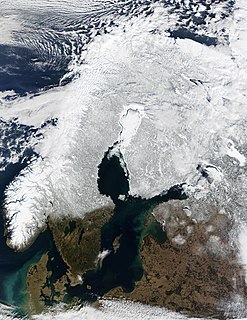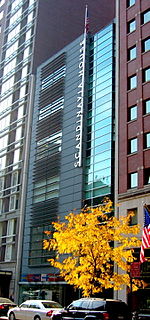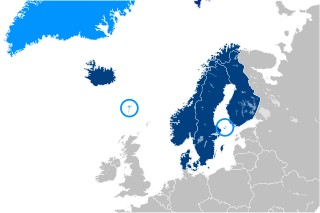
Scandinavia is a region in Northern Europe, with strong historical, cultural, and linguistic ties. The term Scandinavia in local usage covers the three kingdoms of Denmark, Norway, and Sweden. The majority national languages of these three, belong to the Scandinavian dialect continuum, and are mutually intelligible North Germanic languages. In English usage, Scandinavia also sometimes refers to the Scandinavian Peninsula, or to the broader region including Finland and Iceland, which is always known locally as the Nordic countries.

The Scandinavian Peninsula is a peninsula of Eurasia located in Northern Europe, which roughly comprises the mainland of Sweden, the mainland of Norway, and the northwestern area of Finland.

The North Germanic languages make up one of the three branches of the Germanic languages, a sub-family of the Indo-European languages, along with the West Germanic languages and the extinct East Germanic languages. The language group is sometimes referred to as the "Nordic languages", a direct translation of the most common term used among Danish, Faroese, Icelandic, Norwegian, and Swedish scholars and laypeople.

The Norsemen were the North Germanic peoples of the Early Middle Ages, during which they spoke Old Norse language and practiced Old Norse religion. The language belongs to the North Germanic branch of the Indo-European languages and is the predecessor of the modern Germanic languages of Scandinavia. During the late eighth century, Norsemen embarked on a large-scale expansion in all directions, giving rise to the Viking Age. In English-language scholarship since the 19th century, Norse seafaring traders, settlers and warriors have commonly been referred to as Vikings. Though lacking a common ethnonym, the Viking Age Norsemen still had a common identity, which survives among their modern descendants, the Danes, Icelanders, Faroe Islanders, Norwegians and Swedes, who are now generally referred to as "Scandinavians" rather than Norsemen.

Fennoscandia or the Fennoscandian Peninsula is the geographical peninsula comprising the Scandinavian Peninsula, Finland, Karelia, and the Kola Peninsula. It encompasses Finland, Norway and Sweden, as well as Murmansk Oblast, much of the Republic of Karelia, and parts of northern Leningrad Oblast in Russia.

Scandinavism, also called Scandinavianism or pan-Scandinavianism, is an ideology that supports various degrees of cooperation among the Scandinavian countries. Scandinavism comprises the literary, linguistic and cultural movement that focuses on promoting a shared Scandinavian past, a shared cultural heritage, a common Scandinavian mythology and a common language or dialect continuum, and which led to the formation of joint periodicals and societies in support of Scandinavian literature and languages. Nordism expands the scope to include Iceland and Finland.

The American-Scandinavian Foundation (ASF), is an American non-profit foundation dedicated to promoting international understanding through educational and cultural exchange between the United States and Denmark, Finland, Iceland, Norway, and Sweden. The Foundation's headquarters, Scandinavia House: The Nordic Center in America, is located at 58 Park Avenue, New York City.

Scandinavia House – The Nordic Center in America is the American-Scandinavian Foundation's cultural center at 58 Park Avenue, in Murray Hill, Manhattan, New York, dedicated to preserving the history of the Scandinavian and Nordic countries in the United States through a wide variety of exhibits and programming. This cultural center hosts exhibitions of fine art, design as well as performing arts pieces from Nordic countries. The center also introduces the local population and guests with Scandinavian languages and customs by organizing courses.

The Nordic Flag Society is an association of Nordic vexillologists. It has an official name in the languages of all the five countries in which its activities are principally based: Nordiska Flaggsällskapet (Swedish), Nordisk Flagselskab (Danish), Nordisk Flaggselskap (Norwegian), Pohjoismaiden Lippuseura (Finnish), and Norræna Fánafélagið (Icelandic). Founded in Copenhagen on 27. January 1973, the Nordic Flag Society is dedicated to the study of flags and promotion of vexillology in Scandinavia.
The Society for the Advancement of Scandinavian Study (SASS) is a scholarly society that aims to advance the study, teaching and research in America of the languages, literature, history, culture and society of the Scandinavian or Nordic countries and to foster closer relationships between people interested in the field of Scandinavian studies.

Scandinavian studies is an interdisciplinary academic field of area studies, mainly in the United States and Germany, that covers topics related to Scandinavia and the Nordic countries, including languages, literatures, histories, cultures and societies. The term Scandinavia mainly refers to Denmark, Norway and Sweden, although the term Scandinavian in an ethnic, cultural and linguistic sense also refers to the peoples and languages of the Faroe Islands and Iceland, and the Scandinavian-speaking minority in Finland. Scandinavian studies does not exist as a separate field within Scandinavia or the Nordic countries themselves, as its scope would be considered far too broad to be treated meaningfully within a single discipline. The closest related field in Scandinavia would be the more narrow discipline of Nordic linguistics, which covers North Germanic languages. A major focus of Scandinavian studies is the teaching of Scandinavian languages, especially the three large languages Danish, Norwegian and Swedish.
The Nordic agrarian parties, also referred to as Nordic Centre parties or Agrarian Liberal parties are agrarian political parties that belong to a political tradition particular to the Nordic countries. Positioning themselves in the centre of the political spectrum, but fulfilling roles distinctive to Nordic countries, they remain hard to classify by conventional political ideology.
The Nordic model comprises the economic and social policies, as well as typical cultural practices, common to the Nordic countries. This includes a comprehensive welfare state and multi-level collective bargaining, with a high percentage of the workforce unionised, while being based on the economic foundations of free market capitalism. The Nordic model began to earn attention after World War II.
The Scandinavia Philatelic Society was founded in the United Kingdom in 1952 as the Scandinavian Collectors Club, to promote the collection of Stamps, Postcards and Postal History of greater Scandinavia. That is Denmark, Finland, Norway, Sweden, Iceland, Greenland, Faroe Islands, Danish West Indies, Åland Islands and Spitsbergen.
Nordic noir, also known as Scandinavian noir or less formally Scandi noir, is a genre of crime fiction often written from a police point of view and set in either Scandinavia or one of the other Nordic countries. The language is plain and deliberately avoids metaphor, the settings often have bleak landscapes, and the mood is dark and morally complex. The genre depicts a tension between the apparently still and bland social surface in the Nordic countries, and the murder, misogyny, rape, and racism it depicts as lying underneath. It contrasts with the whodunit style such as the English country house murder mystery. The popularity of the genre has extended to film and television, such as The Killing and its American adaptation, Marcella, and The Bridge and its French-British and American adaptations.
Pat Thane is a professor of Contemporary History at King's College London as well as a general historian. She teaches on the MA in Politics and Contemporary History: modules on Welfare and the State in Britain 1900-1945, 1945–present and contributes to modules on politics and society since c. 1900. She was the Leverhulme Professor of Contemporary British History in 1998–2001 at the Institute of Historical Research and a Professor at the University of Sussex from 1994 till 2001.
Michelle Facos is an American art historian, Professor of Art History at Indiana University, Bloomington.
Drude Dahlerup is a Danish-Swedish professor of Political Science at Stockholm University. Her main research area is gender and politics. She is an international consultant on the empowerment of women in politics and a specialist on the implementation of gender quota systems. Spokesperson for the EU-critical center-left June Movement during four Danish referenda in the 1990s.
Inger Zachrisson is a Swedish archaeologist specializing in the history of the Sami people. As Associate Professor of Archaeology at Uppsala University and former curator of Stockholm's History Museum, she has researched Sami archaeology and history since the Iron Age.









